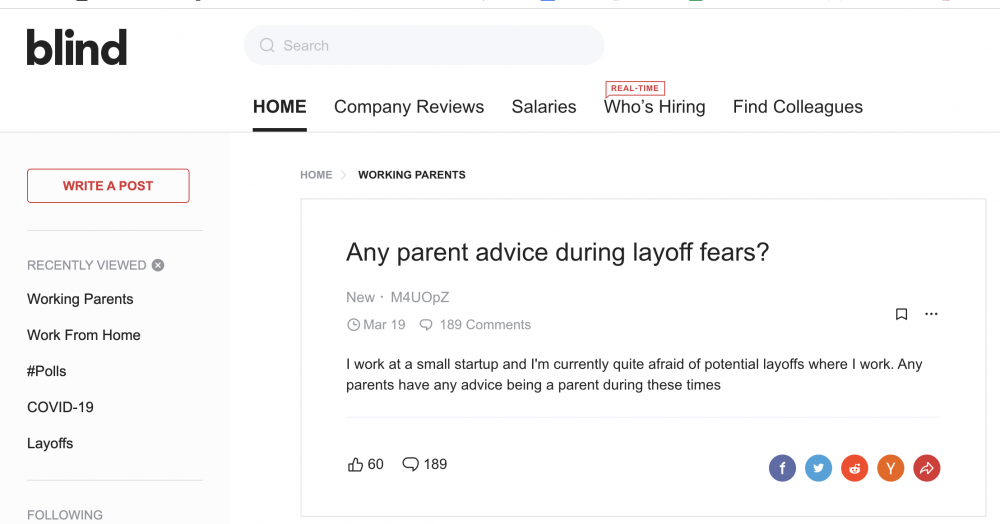53% of Working Parents Continue To Fear Their Performance Being Unfairly Evaluated
It’s undeniable that every professional struggled to adjust to the “work-from-home” normal. These adjustments were even tricker when your new coworkers are under the age of 18. In April, we shared what working parents were feeling in terms of productivity, time spent trying to do their jobs, and unfair performance evaluations. Blind, an anonymous professional network, with 3.6M verified users, took to the platform and asked our users the same three questions, to get a pulse on how working parents are feeling.
- Are you a parent and working from home with a child?
- How many additional hours does it take to complete your typical workday deliverables?
- Are you concerned your performance is being inequitably compared to your colleagues?
Key Findings as of 8/31 (~2,400 Responses):
- 24% of surveyed working parents are working 4+ additional hours to complete their typical workday deliverables
- Compared to 15% of professionals who are not working parents
- 21% of working parents are not working additional hours
- 26% are working 1-2 additional hours
- 34% of Google’s working parents are working 4+ additional hours
- 40% of Facebook working parents are working 4+ additional hours
- 35% of Salesforce’s working parents are working 1-2 additional hours
- 53% of surveyed working parents are concerned their performance is being inequitably compared to their colleagues
- Compared to 32% of professionals who are not working parents
- 75% of Exxon Mobile working parents are concerned
- 70% of PayPal working parents are concerned
- 69% of Airbnb working parents are concerned
- 50% of Capital One working parents are concerned
Download the raw data: here.
April Key Findings (~6,163 Responses):
- 53.3% of surveyed professionals are working from home with a child
- 61% of surveyed working parents are working 3+ additional hours to complete their typical workday deliverables
- 14% of working parents are not working additional hours
- 25% are working 1-2 additional hours
- 68.8% of Google’s working parents are working 3+ additional hours
- 65% of Facebook working parents are working 3+ additional hours
- 35.8% of Salesforce’s working parents are working 1-2 additional hours
- 51.6% of surveyed professionals are concerned their performance is being inequitably compared to their colleagues
- 71.4% of Lyft
- 60.8% of Google
- 62.3% of Facebook
- 57.2% of Microsoft employees

Why it matters:
It has been five months since the original survey, and there has only been marginal change in the struggles working parents are encountering. In April, Blind opened up a working parent channel where parents are sharing their gratitude, frustrations, and unfiltered truths about what it’s like to have a career and a child during a pandemic. No two households face the same challenges; similarly, no two colleagues have the same needs. This puts a new emphasis on the need for open and transparent communication. With no improvements or accommodations, working parents continue to face the same challenges they did at the beginning of the pandemic.
The continued co-mingled work and personal life have varying needs. One coworker’s want for a virtual happy hour may be a burden on a working parent who needs that time to cook family dinner. Navigating those different expectations requires transparency. Communicating which blocks of time on your calendar are realistic time commitments for you is the most effective way for work expectations and deliverables to be met. Flexible work arrangements give professionals the freedom over when and where they can effectively fulfill their job responsibilities. For example, a working parent may want to squeeze in that important client call during an established nap time, allowing the flexibility for that is vital.
Empathy is needed now more than ever. We are all ironing out the hiccups of what this new “normal’ is. It is important to see the humanity in your team and acknowledge that they have dynamic lives outside of someone you bumped into in the kitchen or shared your workspace with. This means setting realistic expectations and goals for the new working environment. This is an opportunity for organizations, business leaders, and managers to brand themselves as someone your peers can seek out for support, resources, encouragement, or to vent.
The bottom line:
The coronavirus has no end date in sight. The reality is that all parents are currently working two full-time jobs, which in and of itself is stressful enough. The narratives of the everyday working parent matters in this, let’s actively listen to their concerns and needs, and built a work culture that supports them, not punishes them. By giving working parents the flexibility and support they need to care for their children, employers can help reduce the burden on children.